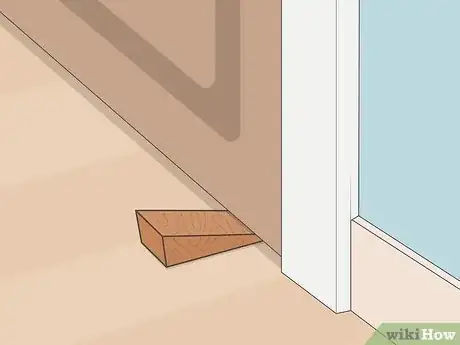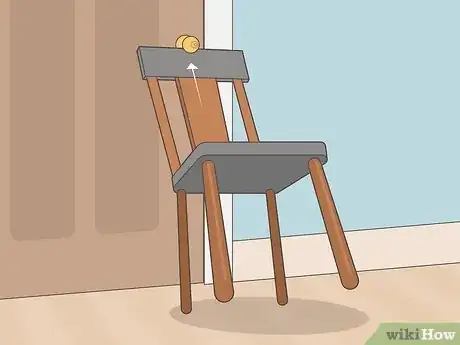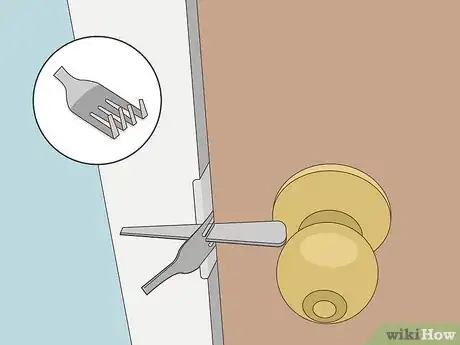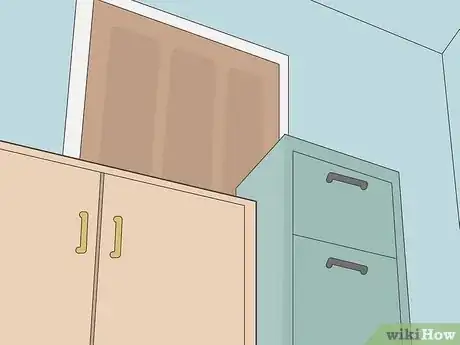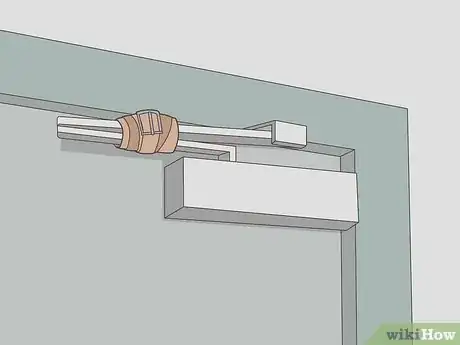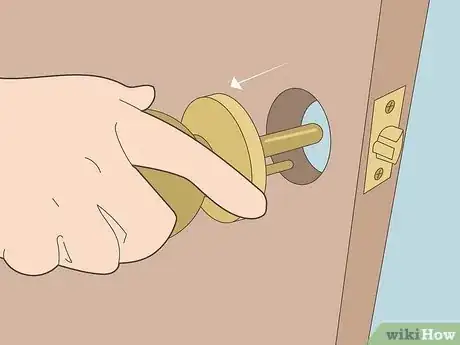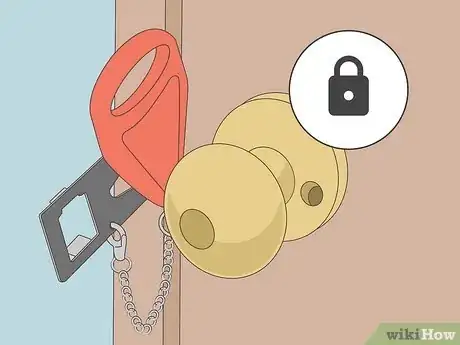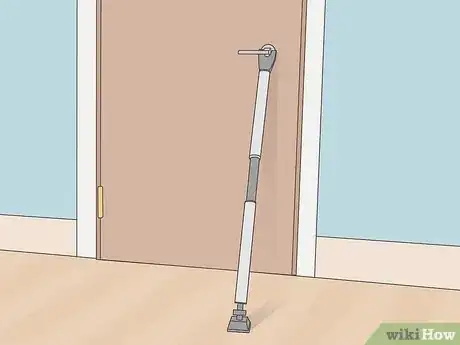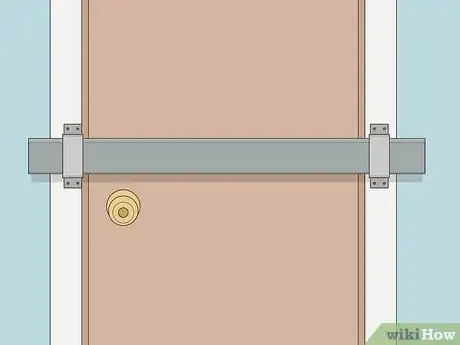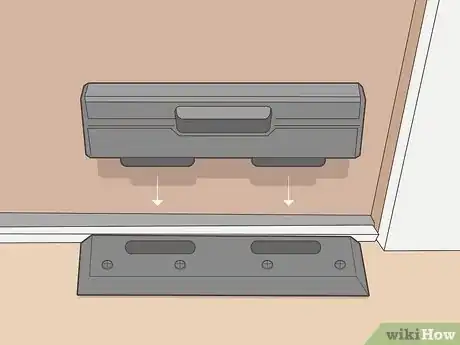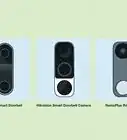This article was co-authored by Barry Zakar and by wikiHow staff writer, Aly Rusciano. Barry Zakar is a professional handyman and the founder of Little Red Truck Home Services based in the San Francisco Bay Area. With over ten years of experience, Barry specializes in a variety of carpentry projects. He is skilled at constructing decks, railings, fences, gates, and various pieces of furniture. Barry also holds his MBA from John F. Kennedy University.
There are 14 references cited in this article, which can be found at the bottom of the page.
This article has been viewed 40,696 times.
Looking for simple ways to secure a door without a lock? Whether you’re hoping to lock your house, apartment, or office door, we’ve got you covered. In this article, we'll cover the best ways to temporarily lock your door when you're in a pinch, as well as more permanent store-bought options you can try, so you can feel safe and rest well.
Steps
Use a doorstop.
-
Jam the door shut with a wooden, plastic, or rubber wedge. Door wedges or stops are often used to keep doors open, but they can also keep doors shut. Close your door and stick the pointy end of the wedge in the gap between the floor and the door. Kick it in until it’s immovable.[1] X Research source
- Alternatively, make a doorstop out of household items like a shoe or cardboard box.
- This method is a temporary fix for inward-swinging doors with a gap between the door and the floor.
Wedge a chair under the door knob.
-
Barricading the door with a chair can keep it closed. Take a chair that’s a little higher than your door knob and position it under the knob at a 45-degree angle. Wedge the backrest underneath the knob—the front legs will be off the ground because of this.[2] X Research source [3] X Research source
- This locking method works on inward-swinging doors and is a temporary fix as the chair could slide out from under the handle.
Bend a fork into the door latch.
-
Make your own lock out of a fork for a temporary fix. Use pliers to bend ¼ of a fork’s prongs up at a 90-degree angle. Cut the fork's handle off with wire cutters, leaving about 1 inch (2.5 cm) on the prong end. Open the door and put the bent prongs in the door latch. Close the door on the fork with the end sticking out. Insert the fork’s handle through the prongs horizontally, with half of it across the door and the other half over the door frame.[4] X Research source
- Place a piece of cardboard or a towel on the side of the handle across the door frame to keep the door from wiggling.[5] X Research source
- This locking method is portable, easily made, and works on inward- and outward-swinging doors with a latch.
Place furniture in front of the door.
-
Build a barricade out of nearby furniture to keep someone out. Place chairs, desks, beds, cabinets, or bookshelves in front of an inward-swinging door. This will ensure that the door can’t swing open.[6] X Research source
- Use whatever is around that’s heavy to block the door. The best items are those that take up half of the door.
- This locking method is temporary and not foolproof.
Tighten a belt around the door hinge.
-
Use a belt or rope to lock a commercial building door. Many office, hotel, and school doors have an automatic hinge at the top. Barricade one of these doors by wrapping and tying a belt around it. Guide the end of the belt through the hinge arm bolted to the door frame. Then, tightly wrap the belt around the rest of the hinge. Weave the belt through the center of the loop to keep it in place.[7] X Research source [8] X Research source
- Ropes and purse straps can also be effective.[9] X Research source
- This solution is temporary and only works on inward-swinging doors with a hinge.
Remove the door knob.
-
Take the knob or handle off the door from the outside. If you have no other way to lock your door, consider removing the door knob entirely. Use a screwdriver to unscrew the plate of the knob, and then pull the knob off the door.[10] X Research source
- This works on inward- and outward-swinging doors but isn’t a permanent solution.
- Although this method prevents people from getting into the room, it also prevents you from getting out.
- Some door knobs and handles have hidden screws attaching them to the door that may be harder to remove in a pinch.
Purchase a portable door lock.
-
Buy a lock that you can bring and use anywhere. There are many types of portable door locks on the market, but the majority consist of a metal plate and chain with a locking mechanism. Generally, the metal plate is placed in the door’s latch, and the locking mechanism is inserted in a grove on the plate.[11] X Research source
- Follow the product’s instructions for proper installation.
- This solution can be temporary or permanent for inward- and outward-swinging doors, depending on your situation. For example, use it for security while traveling or at home as a second barrier on top of a lockable door.[12] X Research source
Try a door security bar.
-
Wedge a sturdy pole under the knob to secure the door closed. Door jammers or portable security bars are a one-time cost for your peace of mind.[13] X Research source These devices can be found at some convenience stores or online. All you have to do to install these is slide the handle slot under the door knob at a 45-degree angle. Adjust the pole until the base is resting flat on the floor. Push the base toward the door until the pole is standing on its own.[14] X Research source
- This portable lock device can be used on inward-swinging and sliding glass doors.
- For a sliding glass door, remove the door handle slot and wedge the bar between the door frame.[15] X Research source
Invest in a door barricade bar.
-
A wooden or metal barricade bar is a great option if you feel unsafe. These permanent locking devices are easy to install and provide extreme security. Screw the lock anchors on either side of the door frame above the door handle. Make sure these pieces are parallel and level with each other. Slip the metal barricade piece into the anchor slots to lock the door.[16] X Research source
Install a floor barricade.
-
Secure your door with a permanent door stopper. Floor barricades or braces are sturdy metal devices that you attach to the floor on the inside of a door. The metal plate screws into the floor beneath the door, and a block-like door stopper fits inside it. When it comes time to lock your door, close it and place the block stopper inside the plate.[18] X Research source
- Professional installation is required for this lock if you have cement, tile, or stone flooring or are inexperienced with a drill.[19] X Research source
- This permanent locking device works best on inward-swinging doors as you want to be the one removing and placing the block.
- Most floor barricade owners use this device as a secondary lock for additional security on top of a regular lock.
References
- ↑ https://housetrick.com/how-to-lock-a-door/
- ↑ https://www.bobvila.com/slideshow/10-brilliant-ways-to-lock-a-door-without-a-lock-580192
- ↑ https://www.rcuh.com/hidden-document-library/how-to-barricade-a-door/
- ↑ https://youtu.be/9cMlrJWk8qA?t=48
- ↑ https://youtu.be/9cMlrJWk8qA?t=148
- ↑ https://housetrick.com/how-to-lock-a-door/
- ↑ https://www.bobvila.com/slideshow/10-brilliant-ways-to-lock-a-door-without-a-lock-580192
- ↑ https://youtu.be/xlhbiSvVKnE?t=28
- ↑ https://youtu.be/xlhbiSvVKnE?t=21
- ↑ https://housetrick.com/how-to-lock-a-door/
- ↑ https://youtu.be/_9yjLU0wqcw?t=235
- ↑ https://housetrick.com/how-to-lock-a-door/
- ↑ https://www.bobvila.com/slideshow/10-brilliant-ways-to-lock-a-door-without-a-lock-580192
- ↑ https://youtu.be/3UPH9x8D2zo?t=89
- ↑ https://youtu.be/3UPH9x8D2zo?t=182
- ↑ https://youtu.be/H7eASa6c7gE?t=97
- ↑ https://youtu.be/TvusRmsaBlw?t=110
- ↑ https://youtu.be/fqk_pyXcen0?t=244
- ↑ https://youtu.be/fqk_pyXcen0?t=35
About This Article

